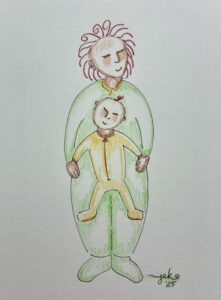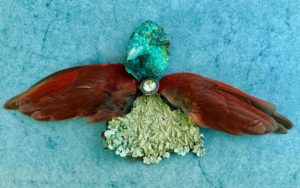
-Artwork © 2025 Jan Ketchel
One of the truths that will leave its permanent mark upon the human mind, as the Aquarian Age we are currently in matures, is that divinity is an inside job.
We all possess a divine directive conscious mind that wields the power of suggestion, as well as a divine receptive subconscious mind that exercises the power of physical creation itself. The conceptive intercourse between this divine couple, more than any other factor, will determine the course of the life we manifest.
The divine conscious mind, given the name ego, is hardly aware of its royal heritage and power, yet it nonetheless exercises its divine prerogative of free will in the expression of its thoughts, beliefs and desires. In response, the divine subconscious mind dutifully manifests these suggestions while independently managing the operations necessary for the survival and growth of the human body.
From the place of transcendent truth, the state of our personal lives, as well as the current state of the world, is wholly the result of ego suggestions to the subconscious mind, both individually and collectively. From the knowing of transcendent wisdom, these suggestions are largely in error, as they threaten absolute destruction of self and all.
Why then, would our divine progenitors, our inner divine parents, allow such dangerous choices? Furthermore, why would these divine parents fund—that is, provide the energy for—such errant decisions?!
In the recent George Clooney movie, Jay Kelly, on Netflix, Timothy, the child therapist character, makes the tragic point about parenting that, “We are only successful once we’ve made ourselves irrelevant.” In order to become irrelevant to our children, they must truly not need us, even if, from a wisdom perspective, they still do.
To not need us means they are assuming full responsibility for their lives. It truly matters not what their choices are, good or bad; it matters that they learn to assume responsibility for them.
How could any of us learn to think and grow if we simply obeyed all the rules? The rules, great and small, are all products of the habitual mind passed down from others’ experiences. They don’t truly become meaningful until they become alive as a consequence of our personal experiences.
Parents do well to defer to the ultimate parent of all, the Law of Cause and Effect or the Karma of our actions. All decisions, good or bad, have their consequences. We grow by suffering the consequences of our decisions.
Our divine progenitors are interested in us becoming truly mature. Hence, they remain present but dormant, unless earnestly consulted by our student ego, at which time they will tell us the truth, from their perspective. They always allow us the full freedom of our choices and the consequences of those choices.
Even in a Near Death Experience (NDE), many souls are, at the ego level of consciousness, asked to assume responsibility for their choice to continue in their current human life or to move into life beyond the human form. Sometimes it is Karma that commandeers that decision.
We are the judge and jury of our own lives. We are not punished for our actions. Karma is simply the natural consequence of our decisions. Of course, if we solicit the guidance and feedback from our inner divine parents, they will respond with their thoughtful wisdom. However, they will not assume responsibility for our own answers to life’s challenges—this is an impossibility.
As Kahlil Gibran, the Persian mystic, clarifies in The Prophet, regarding our children: “For their souls dwell in the house of tomorrow, which you cannot visit, not even in your dreams.” [p. 21]
To be sure, our children must forge the virgin territory of their future with support, but, ultimately, on their own. And we must let them go, even to let them suffer the inevitable woundings of life.
Truthfully, we are all forever divine children. And if we abandon the innocence of curious openness to the unknown, our journey ends. And then we must live in the boring prison of “knowing it all”, until we are ready to resume the hero’s journey of new discovery, now, and beyond this life.
All journeys involve woundings, those of our children and our own as well, but those woundings are the doors through which we change and grow, allowing us to mature into our full potential.
The challenge, through our repetition of our many errors, is to comfortably retire our illusions, and allow our ego to become the mature child that lives its innocence while it also serves the truth of the Divine Self, which funds all its whims, that it may more fully awaken to the splendor of the truth of its divinity.
No shame for any and all sins. They are all divine errors, way stations on our definitive journey. And there is no one, or nothing, to forgive, except perhaps the ego, for all its divine errors. Our ultimate challenge is to assume responsibility, with equanimity, for it all.
All aboard,
Chuck

